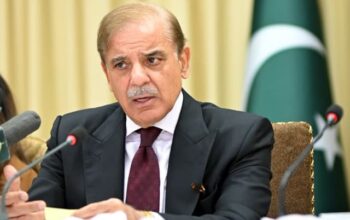By Staff Reporter
ISLAMABAD – Pakistan on Thursday rejected a U. congressional bill targeting the army chief, General Asim Munir, with sanctions, calling it one lawmaker’s move that jars with the warming ties between the two countries.
US Representative Joe Wilson, a South Carolina Republican, tabled the legislation on Tuesday, accusing Munir of stifling democracy and hounding political foes, notably former Prime Minister Imran Khan, now behind bars.
The bill invokes the Global Magnitsky Human Rights Accountability Act, which permits visa bans and asset freezes for rights abusers, and demands action within 180 days.
Wilson, posting on social media, cited a report by The Hill and urged, “The United States must stand with Pakistan’s people and hold accountable those who undermine democracy and persecute opponents.”
Pakistan’s foreign office pushed back, with spokesperson Ambassador Shafqat Ali Khan saying the bill lacks White House backing.
“This is an initiative of a single individual legislator… This is not the position of the US government,” Khan told reporters at a weekly briefing. “We believe that the timing and context of the bill does not align well with the current positive dynamics of Pakistan-US bilateral relations based on mutual respect, understanding and non-interference in each other’s affairs.”
Khan flagged the bill’s long road ahead, needing clearance from House and Senate committees. “The bill will have to go through several committees in the House of Representatives and Senate before passing. We hope that the US Congress will continue its supportive role in strengthening Pakistan-US ties and focus on avenues of mutual collaboration that benefit both our peoples and countries.”
The spokesperson also reaffirmed Pakistan’s dedication to democratic values. “Pakistan remains committed to constitutionalism, rule of law, protection of human rights and freedom of expression, because it considers democracy as a vehicle for prosperity and progress as a nation.”
United Nations demand
Khan also dismissed a United Nations demand to free detained Baloch activists, calling it reliant on “selective and unverified media reports.”
UN human rights experts had pressed Pakistan to release the activists and end its crackdown on what they termed “peaceful” protests. They highlighted concerns over alleged arrests, enforced disappearances, and intensifying police action against the right group Baloch Yakjehti Committee (BYC).
Police arrested several BYC members, including Dr. Mahrang Baloch, on charges of terrorism and inciting rebellion after clashes in Karachi and Quetta. Authorities claim protesters attacked officers and disrupted public services.
Khan said the government has taken note of the statement “issued by certain UN experts, which appears to be based on selective and unverified media reports”. “It is imperative that public statements of this nature adhere to principles of objectivity, avoid selective criticism, reflect factual accuracy, and acknowledge the full context of the situation.”
The spokesman accused the group of “synchronized roadblocks facilitating terrorist attacks” and an “unlawful storming” of Quetta’s District Hospital to seize the bodies of five terrorists killed in a hostage rescue. “Three of these bodies were retrieved back from these violent protesters by the police.”
He criticised the UN for “downplaying civilian casualties inflicted by terrorist attacks” while ignoring “crimes committed by miscreants who deliberately disrupt public services, obstruct freedom of movement, and create an atmosphere of insecurity.”
Khan insisted the detained activists are “active participants in a broader campaign of lawlessness and violence.”
The spokesperson defended the government’s legal actions, stating, “Legal proceedings against individuals involved in these activities are strictly in accordance with the law of the land.”
He warned that the UN’s call “risks undue interference in sub judice matters before domestic courts,” adding, “Such interventions not only undermine the rule of law but also set a troubling precedent of disregarding sovereign legal processes.”
The government expressed openness to dialogue with UN human rights bodies but insisted it must be based on “mutual respect, objectivity, and adherence to facts.”
Copyright © 2021 Independent Pakistan | All rights reserved




